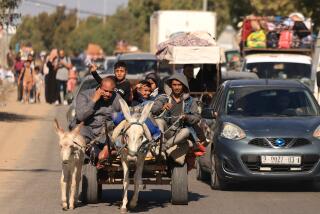Defiant Serbs Launch Attack; Yeltsin Issues Warning : Bosnia: Action comes as new sanctions take effect. U.N. troops are ordered to protect Muslim civilians.
- Share via
BELGRADE, Yugoslavia — Serbian rebels launched a major assault Tuesday in northwestern Bosnia-Herzegovina in what appeared to be defiance of Western governments that have been threatening to use force to end the Balkan war.
The attack took place as Russian President Boris N. Yeltsin issued a stern warning to the Serbs and Secretary of State Warren Christopher testified before a Senate panel on possible action in the Balkans. Their statements came as tougher U.N. economic sanctions against Yugoslavia took effect.
Yeltsin, fresh from his victory in Sunday’s Russian referendum, warned the Serbs that they cannot expect Moscow to stand by them if they block an international peace plan, and he called for “decisive measures to stifle the conflict.” But the Foreign Ministry said Russia still opposes military intervention.
Russia has veto power in the United Nations and could block Security Council efforts to take action against the Serbs.
Yeltsin said that “the U.N. will stand against Serbian nationalists and any other warring parties who are gambling on force.” He urged the deployment of U.N. observers in and around Bosnia and the convening of an international conference on Balkan security.
Christopher said he would favor the use of force in the Balkans only under certain conditions.
“I am perfectly--personally--quite prepared to see the United States use force not only there but anyplace around the world,” he said. “But it has to meet some very severe tests.”
He said that air strikes to force Bosnian Serbs to accept a peace agreement must meet four tests: a goal that is clear and understandable to the American people; a strong likelihood of success; public support and “an exit strategy” so U.S. forces do not become embroiled in a Balkan war.
Tuesday’s invasion of the vulnerable Bihac region in northwestern Bosnia by as many as 1,000 Croatian Serbs riled the commander of U.N. peacekeeping forces in the former Yugoslav federation, prompting him to order his troops to defend endangered civilians with all vigor.
Gen. Lars-Eric Wahlgren, the U.N. Protection Force commander, said he has instructed the French battalion deployed in Bihac to take all measures to protect the 300,000 predominantly Muslim residents of the “Bihac pocket” from forced eviction from their homes or other aggressive acts by the invading Serbian forces, backed by 10 tanks and dozens of artillery pieces.
Asked how the peacekeepers could ensure the safety of civilians when their U.N. mandate allows them to use weapons only in self-defense, Wahlgren said his troops may have to put themselves in the line of fire.
“You position people on top of the houses to prevent them from being blown up,” the Swedish general told journalists here after a series of talks with Serbian leaders.
If such determined defensive steps are taken by the 800 or so U.N. troops in the Bihac region, it would represent a serious toughening of the mission’s attitude toward the rebel forces they have largely stood by and watched wreak havoc in the republic for the past year.
There were no immediate reports of casualties from the rebel push into the Bihac region, which is surrounded on all sides by Serb-held territory and cut off from communications with the Bosnian capital of Sarajevo.
While Wahlgren cautioned the Serbs against pressing the offensive, his deputy suggested that the invasion may have been part of an internal Serbian power play.
U.N. civilian affairs chief Cedric Thornberry said that most of the Serbian gunmen seen crossing from U.N.-controlled territory in central Croatia into the Bihac area were “old men” and that their numbers were too few to make any serious attempt to conquer the relatively well-defended Muslim pocket.
Serbs who live in the U.N.-protected areas of Croatia have been angered by recent signals from Belgrade that they cannot count on unlimited Serbian support in their struggle to wrest their enclaves from the government of Croatia and annex them to a Greater Serbia.
Serbian President Slobodan Milosevic is thought to want to trade off the distant and impoverished Croatian Serb region known as Krajina for the fertile farmland and vital industries in Serbian-occupied eastern Croatia, which borders his republic.
Sensing a sellout, the Krajina Serbs may have launched the Bihac invasion to remind Belgrade that they have the power to provoke the wrath of the international community.
Several Western countries, the United States foremost among them, have been threatening to intervene militarily in the Bosnian war if Serbian forces continue to attack and displace civilians in their quest for an ethnically pure state.
Wahlgren said his official inquiries about the early morning invasion drew denials of involvement from all Serbian leaders--Milosevic on the Serbian republic level, Yugoslav federal President Dobrica Cosic and the commander of Krajina forces, Gen. Mile Novakovic.
Meanwhile, there were further signs of belligerence among the Bosnian Serbs, whose rogue Parliament early Monday shot down a final peace plan proposed by U.N. and European Community mediators.
The chief of staff of the Bosnian Serb rebel army, Gen. Manojlo Milovanovic, threatened to cut off all supplies to the besieged eastern Bosnian town of Srebrenica--including goods destined for the 150 Canadian troops deployed there--unless the region is “completely demilitarized” by May 7.
Bosnian Serbs encircling Srebrenica contend that the U.N. forces trying to restore order there are obligated to track down and disarm defenders who fled or buried their weapons to avoid being stripped of their arms in compliance with Srebrenica’s designation as a U.N.-protected area.
More to Read
Sign up for Essential California
The most important California stories and recommendations in your inbox every morning.
You may occasionally receive promotional content from the Los Angeles Times.














